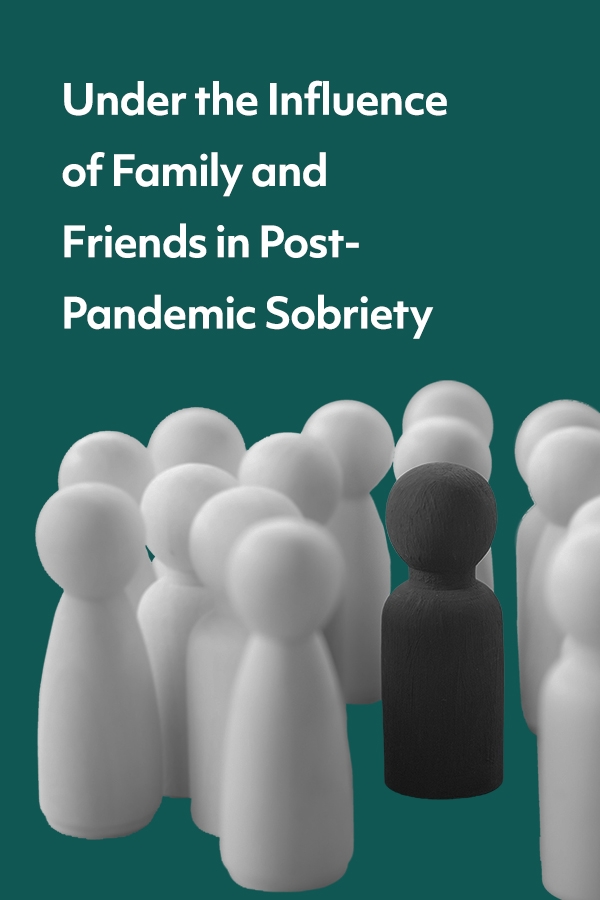For many in recovery, returning to socializing in person means once again navigating relationships and sobriety.
The COVID-19 pandemic ushered in crisis and catharsis, grieving and growing all at once. While the world shuttered away in the interest of public and personal health, many leveraged the time alone as an opportunity to improve well-being, redefining what it meant to be alive.
These life evolutions are as diverse as the people themselves, but the one I bear witness to the most is the decision to limit or eliminate drinking alcohol.
As someone sober for a little over four years, the pandemic did not force me into a selective pod; it merely reinforced the one I had already been creating. I continued to participate in alcohol-free groups and communities where the populations grew during the clutches of COVID.
While they were alone, many examined the impacts alcohol had on their relationships with others and with themselves. During this separation from the drinking culture at large, these people spent time drinking alone in the confines of a pseudo echo chamber, asking, “Is this a mechanism for joy or pain?”
These were not simply decisions made in a foxhole. They were life-changing reflections, made easier by the absence of an audience. Free to be curious without criticism, these people conducted the trials and errors of existing alcohol-free while accountable to no one but thy-own self.
With the end of isolation, many newly sober people are returning to social roles that no longer fit
While incredibly progressive, these people in early recovery have only tested controlled environments, placing themselves in spaces where they felt safe and known. However, new challenges and anxieties arise as society reemerges from the pandemic quarantines. Vacations with friends become booked, the family expects a long-overdue reunion, and colleagues resume in-person happy hours.
Suddenly thrust back into old dynamics and expectations, pandemic-sober folks find themselves flexing new muscles around old bones, saturated in distantly familiar circumstances. Perhaps the family bartender a few years ago, they now face reframing their identity and role within the unit. Then there are the brunches with friends, happy hours with colleagues, and so many social situations in which drinking was a part of (or entirely) the activity. The discomfort newly sober people often feel is not craving-related; it is the burden and the weight of others’ insecurity around the decision.
Last summer, a friend quit drinking and is now integrating back into family trips and vacations after vaccinations. Talking about an upcoming camping trip with siblings, they shared their concerns. “I don’t want to draw attention to myself; I feel like if I say no to a beer, my brother will make a huge deal of it. It’s how we used to get warmed up, a couple of drinks over the fire. I just want “no” to be a sentence.”
Another felt torn between attending a brunch-y baby shower and staying home. “I want to go, and I think my friends will support me when I tell them I quit drinking. I worry that seeing others having fun the way I once did will make me regret my decision. I feel like I will have a fear of missing out, and it will get the best of me.”
These conversations, specifically around sobriety found during the pandemic and now tested in the aftermath, reminded me of the worries I had newly sober in 2017.
Could I enjoy my travels to Italy without wine?
Would music sound the same without a proper buzz?
Would I make people uncomfortable when I refused a drink?
The answers to all of these were an eventual yes.
A large part of recovery is planning for behavior in response to outside influences, including family and friends.
Belonging, with boundaries
The following are my well-developed strategies for existing as a sober person in society and within a family. I implement them before all situations in which the only thing I can control is myself.
- It’s science: I tell inquisitors that I am allergic to the neurotoxins in alcohol. This might bring further attention to the situation, but I find it leaves most genuinely wanting to know more. The genius is that—as unbelievable as it sounds—it’s true! Even in the brains of moderate drinkers, long-term cell damage and atrophy occur due to alcohol’s toxicity (Topiwala, et al. 2017).
- Hold on: I make a plan to have something to hold in my hand. It may be a can or bottle of seltzer or soda, a phone, or even just my other hand.
- Wing it: I designate a wing person who understands my harm reduction and supports it. I explicitly tell them my concerns, and we agree on signals and strategies to distract any negative attention.
- Gum’s the word: Research shows that chewing gum can reduce stress and relieve anxiety (Johnston, et al. 2012). There’s something about the masticating mechanics that soothes tension. I often carry a pack just in case I feel my jaw clench. Gum chewing also helps me focus when I am susceptible to distractions. As a newly sober individual, gum came in handy when I went to functions that presented me with high risk.
- DM: Direct messages of any kind are powerful because they are personal. In my early sobriety, I prepared for social situations and events ahead of time by identifying the attendees with whom I would most likely interact. From there, I would craft and send tiny personal mission statements about my new recovery, complete with instructions on how to and how not to support me during the event. I did this the day or night before the event so that my colleagues, family, or friends had time to reflect and respond. This preparation removed the guesswork for everyone and opened incredibly thoughtful dialogues around the choice to not drink in a space that felt safe.
The ultimate goal is to retain the community from the past that serves the sobriety of the present. There is no loophole for the discomfort; you can count on this to be complicated. However, there are ways to move through the growth with preparation and practice.
Citations and DOI:









